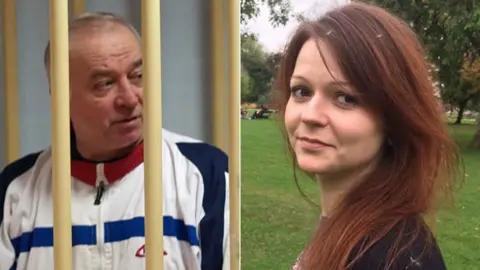Russia spy row: UK lab could be poison source, says ambassador
Russia's EU ambassador has suggested a UK research laboratory could be the source of the nerve agent used in the attack on an ex-spy and his daughter.
Vladimir Chizhov told the BBC's Andrew Marr Show Russia had "nothing to do" with the poisoning in Salisbury of Sergei Skripal and his daughter Yulia.
He said Russia did not stockpile the poison and that the Porton Down lab was only eight miles (12km) from the city.
UK Foreign Secretary Boris Johnson described the claims as "satirical".
Retired military intelligence officer Mr Skripal, 66, and Yulia, 33, remain critically ill in hospital after being found slumped on a bench in Salisbury city centre on 4 March.
UK Prime Minister Theresa May has told MPs that Porton Down - Britain's military research base - identified the substance used as being part of a group of military-grade nerve agents known as Novichok developed by the Soviet Union.
Chemical experts arriving
Mr Johnson told the Marr Show that Russia's reaction to the incident "was not the response of a country that really believes itself to be innocent".
He said the UK had evidence that Russia, within the last 10 years, had been developing and stockpiling Novichok, as well as investigating the delivery of nerve agents for the purpose of assassination.
He also said experts from the Organisation for the Prohibition of Chemical Weapons (OPCW) would arrive in the UK on Monday to test samples of the nerve agent.
The results are expected to take a "minimum of two weeks", the Foreign Office added.
 EPA/ Yulia Skripal/Facebook
EPA/ Yulia Skripal/FacebookMr Chizhov, when asked how the nerve agent came to be used in Salisbury, said: "When you have a nerve agent or whatever, you check it against certain samples that you retain in your laboratories.
"And Porton Down, as we now all know, is the largest military facility in the United Kingdom that has been dealing with chemical weapons research.
"And it's actually only eight miles from Salisbury."
Allow X content?
But pressed on whether he was suggesting Porton Down was "responsible" for the nerve agent in the attack, Mr Chizhov said: "I don't know. I don't have any evidence of anything having been used."
He said a number of scientists who claim to be responsible for creating some nerve agents "have been whisked out of Russia and are currently residing in the United Kingdom" but no stockpiles of chemical weapons had left the country after the collapse of the Soviet Union.
He added that there were "no stockpiles whatsoever" of nerve agents left in Russia.
Russia 'manipulation'
Mr Chizhov's comments come after a Russian foreign ministry spokeswoman said the UK was one of the most likely sources of the nerve agent, along with the Czech Republic, Slovakia, Sweden or possibly the United States.
Maria Zakharova said a large number of ex-Soviet scientists had gone to live in the West, "taking with them the technologies that they were working on".
Czech foreign minister Martin Stropnicky said the claims were "unsubstantiated" and "a classic way of manipulating information in the public space", while Sweden also "forcefully" rejected the suggestion.
Allow X content?
Chemist Vil Mirzayanov, who revealed the existence of Novichok in the 1990s and later defected to the United States, said he was convinced Russia created the substance used in the attack.
He told the BBC: "Russia is the country that invented it, has the experience, turned it into a weapon. This is the country that has fully mastered the cycle."
On Saturday, the Russian foreign ministry said UK staff would be expelled from Moscow within a week, in response to Britain's decision to expel 23 Russian diplomats.
It also said it would close the British Council in Russia, which promotes cultural ties between the nations, and the British Consulate in St Petersburg.
'Unpredictable and aggressive'
The UK foreign secretary will meet his EU counterparts and Nato Secretary General Jens Stoltenberg for talks in Brussels on Monday.
Mr Stoltenberg said he expected the response to Russia to be reassessed at July's Nato summit, telling German media the Salisbury attack followed a pattern of Russia "becoming more unpredictable and more aggressive".
Theresa May said the UK government would consider its next steps "in the coming days, alongside our allies and partners".
Labour shadow attorney general Shami Chakrabarti reiterated Labour's position that the incident was either a "loss of control" by the Russian state or a "malevolent directed attack".
And John McDonnell, the shadow chancellor, said Labour had given a "constructive critique" in response to the incident which others "had misread".
He told ITV's Peston on Sunday: "We support exactly what the prime minister said and we condemn Russia for this, condemn them."
